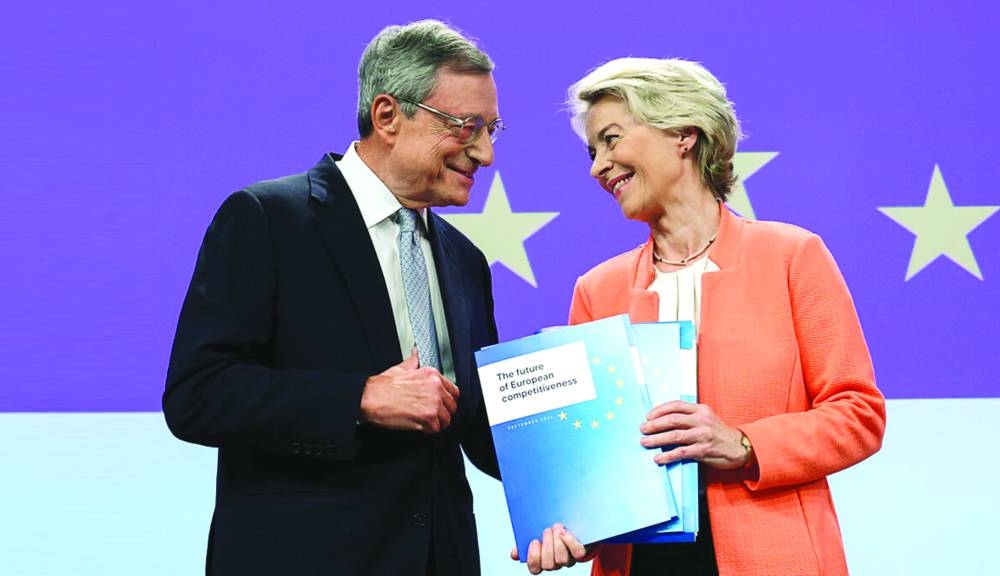According to Draghi, the challenges Europe is facing are nothing short of existential. Over the past two decades, income growth per capita in the EU has lagged behind that in the United States. More ominous, Europe is fundamentally unprepared to navigate a fast-changing global environment characterised by rising geopolitical tensions and rapid technological transformation.
With the most open economy among the world’s major powers, Europe is highly vulnerable to trade tensions and other disruptions. Complicating matters further, Europe is heavily dependent on imported energy and critical raw materials, and confronts higher energy costs than its global rivals. Access to cheap energy is vital to economic leadership.
Europe also lags behind countries like the US and China on technological innovation and commercialisation. In fact, the EU’s presence in the tech industry is marginal, with no EU company ranking among the world’s top ten tech firms by capitalisation. The EU is losing its edge even in industries it once dominated, such as automobiles. The problem is not a lack of ideas; rather, Europe has struggled to translate its ideas into commercial successes.
Economists agree that competitiveness is rooted not in trade surpluses, but in productivity, and here the EU is floundering. Europeans tout their superior social model and high quality of life. But if demographic trends and stagnant productivity persist, these advantages will soon be unaffordable.
Draghi paints a dismal but realistic picture. Before implementing drastic policy changes, such as those Draghi proposes, Europeans must establish a solid political consensus on the magnitude of the problem, including a clear idea of the strengths and weaknesses of Europe’s form of capitalism. If Draghi’s report does nothing beyond catalysing such a process, it will have been a major achievement.
But the report can do more than help us understand the problems we face; it can also lead us toward more effective solutions. For example, in the 1990s, the prevailing belief was that low productivity reflected labour-market rigidity, but making labour markets more flexible did not lead to a surge in productivity.
According to Draghi, a better approach would focus on bolstering private and public investment. As it stands, however, market fragmentation (which limits scale), along with policymakers’ failure to strike the right balance between tech regulation and support for innovation, is impeding private investment. Meanwhile, a failure to target the right priorities, a lack of industrial-policy tools to advance common EU objectives, and, most important, the inability to raise finance at the European level is undermining public investment.
With this in mind, Draghi argues that refocusing public spending on innovation – as well as removing excessive regulations, which are impeding startups’ ability to scale up – is essential to foster a Europe-wide innovation ecosystem. He does not shy away from advocating subsidies and protections for innovative companies in selected industries as they establish the necessary scale to compete internationally.
Draghi also pushes for the establishment of a unified EU energy market to lower energy costs. He encourages a pragmatic approach to trade with China, with rules tailored to different sectors and technologies. And he recommends the development of an EU “foreign economic policy”, including preferential trade agreements with friendly partners.
Critics might try to present these stances as excessively radical. But Draghi’s report should not be read as a blanket endorsement of discriminatory trade policies and full-scale industrial policy. As he emphasised in his speech at the European Parliament, he is not suggesting that the EU should “pick winners” or calling for blanket protectionism, let alone an overhaul of World Trade Organisation rules.
One of the report’s most important – and welcome – messages is that protecting the single market requires tools that are designed and implemented at the EU level. Another is that, without a deep and liquid market for EU debt, the creation of a European safe asset – crucial to raise financing for public goods – will be impossible, and the capital markets union, which would go a long way toward supporting private investment, will never develop.
Ultimately, Draghi’s report calls for Europe to build something like a war economy and run it hot, using common firepower. But developing a single approach to innovation, energy, defence, industrial policy, and common financing tools will be no easy feat, as it will require strong and sustained political will across the EU.
The EU is not a federation, and economic nationalism has generally prevailed, preventing cross-border mergers, limiting coordination, and impeding common financing. Today, the common EU budget amounts to just 1% of the bloc’s GDP, and the common debt issued in response to the Covid-19 pandemic was temporary by design.
To be sure, with the Ukraine war raging on the EU’s doorstep, and the US-China rivalry threatening the basis of its economic model, there is a growing sense of urgency that could drive Europeans toward a consensus on the need for deeper political and economic integration. But it could also push Europe in the opposite direction, with countries retreating deeper into economic nationalism. Low levels of trust and divergent interests among EU member states, together with the lack of an EU-level democratic process capable of facilitating integration, create plenty of reason to doubt that European leaders will heed Draghi’s warning. — Project Syndicate
- Lucrezia Reichlin, a former director of research at the European Central Bank, is Professor of Economics at the London Business School.

